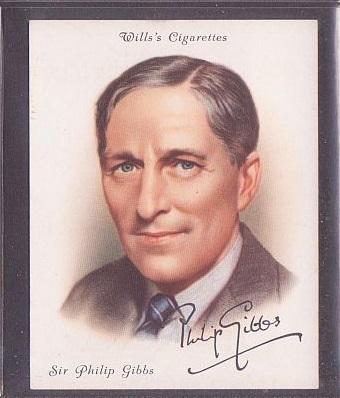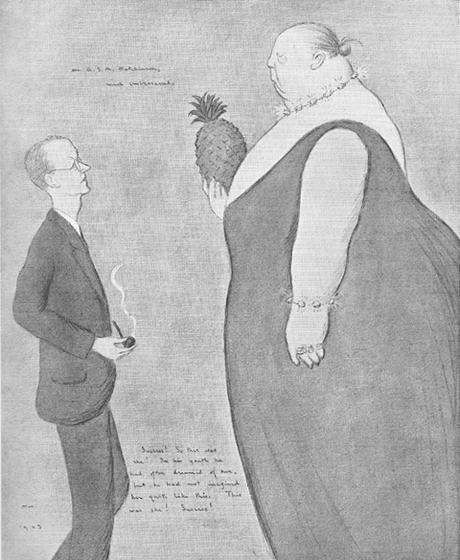Philip Gibbs’s books have been described as ‘newsreel novels’. Typically they take a topic from the headlines and build a story round it. Often this was done at high speed – one of the best, Young Anarchy, about the General Strike, appeared in September, 1926, just a few months after the events it describes.
In The Winding Lane the issue at the heart of the book is more personal than usual. It is the question of the plight of the serious middlebrow novelist.
The hero of The Winding Lane is Philip Brandon, a novelist whose books sell about six hundred copies each, and never make enough in royalties to give him more than his initial advance. He just about gets by financially by writing a weekly column for a syndicate of Northern newspapers, and now and then selling short stories to magazines (at the rate of forty pounds apiece – Gibbs is good on the facts and figures).
At the start of the novel Brandon moves to a village near ‘Harley Green, where Surrey joins Sussex’. It is not a literary place – the inhabitants rarely read, and when they do it is ‘mostly the cheap editions of Edgar Wallace’. He lives in a cottage with his mother, in near poverty, and tries to avoid local society – though he soon becomes enmeshed in it.
Ten years before, he had been a soldier, having enlisted straight out of school. A friend who had been in the war with him describes him:
It was the face of a tortured boy. He hated the war with a deadly loathing and his nerves had gone all wrong. It was lucky for him that he was wounded a week later. I believe he would have cracked. A sensitive plant, not meant for the rough and tumble of a naughty world.
When recovered, he went to France again and became a prisoner of the Germans. In the prison camp he started writing; after the war he became a sub-editor on a newspaper, and then a novelist. Like Gibbs himself, he feels strongly about the mess that is post-war Europe – the unemployment, the aftermath of the Treaty of Versailles. ‘He was one of those fellows who pitied the Germans because we rubbed their noses in the dirt after they made a mess in the world.’
Typically in his novels Gibbs places his hero or his narrator as an honest man in the middle of two extremes; one of his best books is The Middle of the Road, and that would stand as a title for his complete works. Here Brandon is caught between the esoteric and elitist ideas of the cultural elite on the one hand and on the other the simplicities of the literature enjoyed by the masses.
He had escaped to the village because he disliked literary London, whose coteries are represented in the book by the Pen and Palette Club, where advanced people talk about ‘new books and new movements in art, and the new morality, which seemed to him the old immorality disguised under the jargon of psycho-analysis and intellectual Bolshevism.’ These people are shown as victims of fashion, and the literary prejudices of Brandon (and his author) become very clear:
Some of them professed to admire the work of a literary maniac praised by certain critics, but was quite certain they had never read a line of that demon-haunted mind.
(I’m assuming that this must be James Joyce, whose Ulysses everyone talked about but few had read, because it was was banned in Britain.)
Although an ex-soldier, he is also shocked by
the grossness of certain war novels which had lately been the vogue. He had read some of them with interest and emotion. Certainly they had stripped the war of any false glamour which it might have for youth, and some of them had been written in blood and agony, but most of them had falsified the war by bringing in sex stuff which had no place in the normal experience of trench life and billets.
Gibbs had been a war correspondent (probably the best of the war correspondents) and had shown great feeling for the plight of the soldiers. His writing idealised their courage and nobility, and he found the de-glamourising of war in books like All Quiet on the Western Front hard to take.
Brandon’s view of ‘grossness’ is Gibbs’s own:
Personally, as a writing man, he shrank from the foul word and the obscene incident. By all his training in decency he was inhibited from that grossness.
The habitués of the Pen and Palette are the people who make and break literary reputations, like Mark Almond, who
killed a struggling novelist or two every Sunday in the Onlooker, skinned and scalped the latest works of the more famous writers, and gave ecstatic praise to the members of his own group.
Brandon is happy to be away from this crowd, and works hard at a novel about a man like his father, a doctor in a working-class district. He becomes involved in local society, however, and develops feelings for Pearl, a glamorous local woman, while hardly noticing sweet Audrey, the young woman who has actually read and enjoyed one of his novels.
The Way of Escape becomes, unexpectedly, a huge success. It is set on its way by a review on the radio by a woman from the Pen and Palette Club who has a soft spot for Brandon. Other critics write positively about it, too (and Gibbs has fun in quoting reviews that get details of the plot wrong, showing that the critics have not read the book closely).
The book takes off – a new print run of thirty thousand copies, then even more, then huge editions in America, and options to film the book – Brandon is a rich man. Gibbs is showing us that while it is hard to make a living as a writer of novels, it is sometimes possible to make a huge fortune. Gibbs may be thinking of the experience of an author he mentions, A.S.M. Hutchinson, whose 1922 novel If Winter Comes had taken off in a similarly huge way. Max Beerbohm drew a cartoon of Hutchinson encountering the somewhat forbidding figure of ‘Success’

The caption is:
MR. A. S. M. HUTCHINSON, MUCH EMBARRASSED
Success! So this was she! In his youth he had often dreamed of her; but he had not imagined her quite like this. This was she! Success!
Now that he is rich, Brandon marries Pearl – the obviously wrong woman (her fiancé having died at a moment that is very convenient for the plot of the novel). He marries her for her glamour, but is driven to distraction by her wish to live the glamorous life, in a town house in London, where there is always company, and he rarely has the peace and leisure to write, and later in the South of France.
Her father is a gambler, and she shares his taste for living for the moment; if her husband has money, she wants to spend it, and she can’t understand him when he tells her that the income even from a best-seller is finite.
Brandon turns out another novel, but its title, Success, is ironic. The critics who had praised Ways of Escape pounce on this one and denounce it as the work of a mere best-seller, pandering to the public’s sentimentality. And Brandon can’t be sure whether they are right or wrong.
From the point of view of literary sociology, this is a very interesting book; as a novel it is less satisfactory. The characters are mostly types and mostly predictable, rarely doing anything to surprise us. Sometimes Gibbs indulges in his habit of making his characters speak like newspaper editorials. We are told that Pearl is fascinating, but Gibbs doesn’t make us feel her fascination – she is too obviously less nice than quiet sensitive Audrey, who actually understands Brandon’s novels.
Brandon himself can be annoying. Like most of Gibbs’s heroes he is passive. Things happen to him, and he feels bad about them, but does little to rectify things. One bit that particularly annoyed me was when Pearl asks him for five pounds to go gambling at a casino. He gives her a lecture on what five pounds would mean to a family of four in Walworth – but gives her the money anyway.
Gibbs is always better as a reporter than a novelist, and there’s a chapter towards the end where the book springs into life again. Brandon, against his inclinations, decides to earn some money by going on a lecture tour of America.
Gibbs himself had undertaken two such tours, and he gives a funny account of the stresses and indignities of doing a whistle-stop tour of thirty American cities. When Brandon returns, another convenient death brings the novel to an end, and to the promise of a happier life for him.
This book makes Gibbs’s limitations rather evident – he wasn’t good at the crucial novelist’s job of delving into the complexities of character and emotion. He was much better at reporting, and there is less reporting and more love-plot in this novel than in some of his better ones. Still, the picture of a writer’s life, and of the literary world, while definitely prejudiced, are interesting, as is the way that Gibbs defines Brandon’s writing as middlebrow (though he never uses that word) and defends it as the honest way, between the pretensions of the elite, or the pandering to the lowest common denominator of the mass market.
